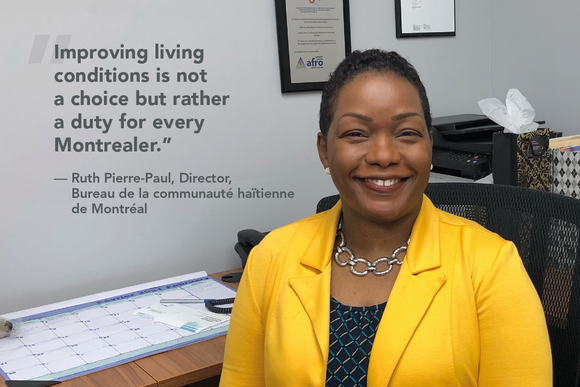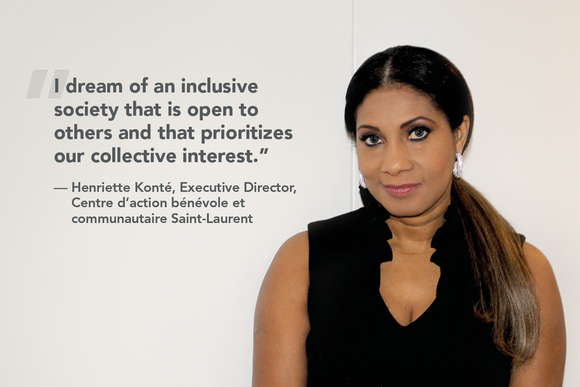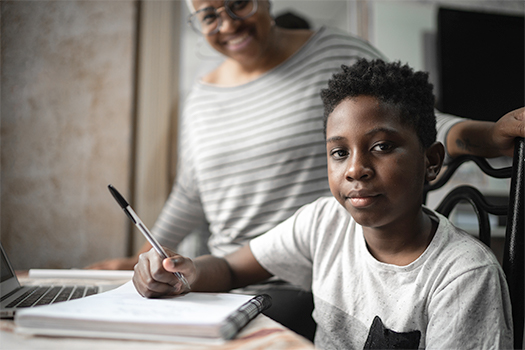February has officially been Black History Month for 25 years now. Every year, we use this month to highlight how Black communities have made rich contributions to the growth and development of Greater Montreal. However, much remains to be done to achieve real equity.
The pandemic and events of the past year have revealed how much injustice and inequality persist for these communities, whose strength is matched only by their determination to make real changes in society.
As we are committed to fighting poverty and social exclusion, Centraide is deeply concerned about the challenges and barriers faced by members of visible minorities. Together with our network of agencies, we work every day to foster diversity and inclusion. We therefore want to add our voice to those of thousands of others taking action here and around the world in order to do even more to make change happen.
In this newsletter, you will read about two women from community agencies that we support, each of whom is shaping these societal changes in her own way.
Read about two women from community agencies that we support, each of whom is shaping these societal changes in her own way.
Portrait
Ruth Pierre-Paul
Twenty years ago, Ruth Pierre-Paul left her native Haiti to work, study and settle in Montreal. A secretarial diploma that she received in Haiti allowed her to start her career and get a job at Centraide of Greater Montreal in 2007 while continuing her university studies. With a bachelor’s, graduate diploma, and master’s in her pocket, in 2010 she became director of the Bureau de la communauté haïtienne de Montréal (BCHM), an agency supported by Centraide.

The opportunities that I had during my immigration experience still fill me with gratitude. They are what motivate me to help people at the BCHM who are looking to improve their situation in Montreal.”
Created in the 1970s and initially dedicated to defending the rights of the Haitian community, the BCHM has become a family support agency under her leadership. It supports children and teenagers throughout their journey to adulthood while relying on the skills and contribution of seniors. The BCHM is a space for all ethnic and cultural groups found in Montreal’s central boroughs. “The agency has always listened to the community. It has evolved in response to its needs and paid attention to the issues and challenges of Black communities in particular.
Ruth Pierre-Paul is concerned about the over-representation of Black children in youth protection services. She has therefore made the BCHM a mediating body with various stakeholders, such as the DYP, to improve interventions with Black communities through a better understanding of them. This is what led to “Option-Protection,” a project supported by other services already in place at the BCHM, and particularly its initiative to enhance the parental experience.
For Ruth Pierre-Paul, Black History Month is not only a showcase for people who are generally invisible but also a time to rewrite history by recognizing Montrealers of African descent. “This is a month of celebration, information and exchange when we use words to heal the ills of the past. It’s also a wake-up call about our failures.”
Pierre-Paul also sees it as an opportunity for us to reflect together on different issues, such as the degree to which young Montrealers of African descent become entangled in the legal system, along with access to employment and the intersectionality of Black women’s experiences. “Improving living conditions is not a choice but rather a duty for every Montrealer.”
We tend to spend more time with people who look like us, and openness to others is something that everyone should experience.”
For Ruth Pierre-Paul, social inclusion is not a utopia; it is the result of constant, repeated effort. Openness to others is daily work. “At the BCHM, we have a language day camp that matches students from welcome classes with students from regular classes. This interaction helps different cultures get to know each other. We tend to spend more time with people who look like us, and openness to others is something that everyone should experience.”
In a few weeks, Ruth Pierre-Paul will have completed a Centraide “hat trick” by becoming a volunteer for the 2021 Campaign Cabinet as a representative from non-profits. She will attend her first cabinet meeting with representatives from all activity sectors in the Greater Montreal area. She still has no idea how much she will contribute to this major fundraising committee because of her experience with the community sector, her in-depth knowledge of social issues, and her belonging to the Black communities of Greater Montreal.
As a fighter, Ruth Pierre-Paul knows how to give everything she has to her mission to do good in the world.

Henriette Konté
Henriette Konté is the Executive Director of the Centre d’action bénévole et communautaire Saint-Laurent. Born in Senegal, this woman with an immigrant background who studied in France is all too familiar with the challenges facing newcomers and racialized people in Greater Montreal.
For her, Black History Month is a time to learn about history and its wrongs, about the progress we’ve made, and about the challenges the Black community must still overcome. But it’s not just about that: for her, this month is also a time to highlight the Black community’s achievements and actions to help create a more inclusive society.
Considering herself privileged to live in Saint-Laurent, where different cultures live in harmony, Henriette Konté is convinced that a community of diverse people from diverse backgrounds is a powerful driver of solidarity and social cohesion. When people come together around common goals and issues, they can work to build strong, responsible and united communities that are empowered.
Henriette Konté is a realist, however, and is well aware that much work remains to provide equal opportunities to everyone. For example, there are big gaps when it comes to the hiring of people from the Black community and recognizing the prior education and work experience from a person’s country of origin. The ultimate goal? End prejudice entirely. Despite the immense barriers that still stand, Konté is hopeful that we will succeed.
Inclusion is the best way for us to live together, and I don’t think
that this is a utopian ideal. At the same time, economic and social inclusion are still issues for visible minorities.”
In Konté’s view, social inclusion has always been an important topic but one that has been a blind spot for the community. Unfortunately, it took recent events, such as the death of George Floyd, to put this issue back in the spotlight. Although these events are tragic, she fervently hopes that they mark the beginning of real transformation.
“Inclusion is the best way for us to live together, and I don’t think that this is a utopian ideal. At the same time, economic and social inclusion are still issues for visible minorities.”
Henriette Konté paints a lovely portrait of her neighbourhood, which is definitely a model of inclusivity given the incredible way that people of diverse origins live together along with its level of citizen engagement and collective vision of social and community development. “In Saint-Laurent, we understand that our diversity is an asset and not a hindrance to our community’s development.”
By encouraging individual empowerment, the community can make the right decisions and implement the best actions to make sure that its best strengths are in place long into the future.
“At the Centre d’action bénévole et communautaire Saint-Laurent, which I have been directing for 14 years, we know that combining our strengths, talents, expertise and skills will make our community stand out through its social cohesion, unity and harmony. It’s important for us to give more power to individuals and groups so that we can act on a community’s social, economic and political conditions. We are true agents of change, and together we have the power to act.”
Her dream
“I dream of the day when there is no more discrimination based on skin colour, gender, religion or social status. I dream of an inclusive society that is open to others and that prioritizes our collective interest.”
Thanks to this initiative to commemorate the history of Black people, Henriette Konté knows that, together, we are taking another step toward making her dream come true.



